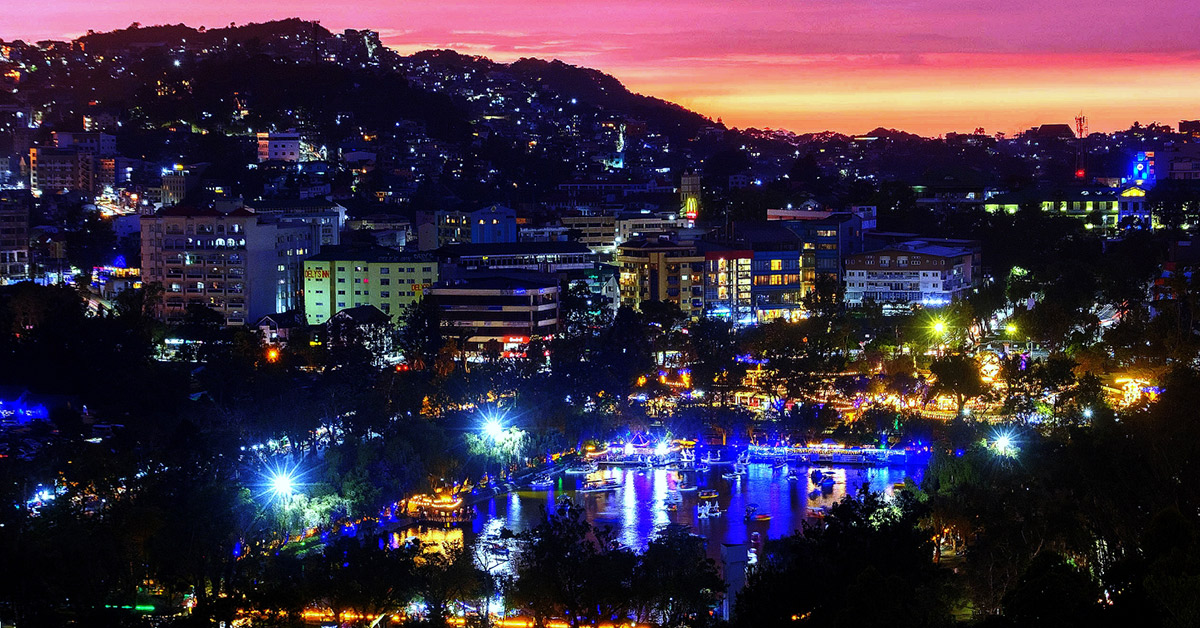Baguio eyes tourist tax to pay for sewage upkeep

WHEN NIGHT FALLS At least a million tourists are drawn to Baguio City each year to experience its cool weather, food, culture and many tourist attractions, including Burnham Park and its sparkling man-made lagoon, shown in this Jan. 11 panoramic nighttime photo. NEIL CLARK ONGCHANGCO
BAGUIO CITY—Visitors here may soon lend a hand in cleaning up some of Luzon’s dirtiest rivers once the local government modernizes the city’s sewerage network and constructs a new wastewater treatment plant.
City officials were mulling over making each tourist pay P80 to enter the summer capital to pay part of the P2-billion bank loan it is planning to secure for the new waste treatment system.
Baguio hosts the headwaters of the Balili, Bued, Asin-Galiano and Ambalanga rivers. But the city’s aged sewer lines and outdated 36-year-old sewage treatment plant (STP) have been unable to clean all wastewater discharged into these waterways. The Balili River, for instance, had a 160 quadrillion recall coliform count in 2020.
The improvement and expansion of seven kilometers of sewer lines and the construction of a modern STP—with an increased capacity to process septage from the current 8,500 cubic meters to 12,000 cu m—are programmed under the Baguio Resilient City Tourism Project (BRCTP) according to City Budget Officer Leticia Clemente during the city council session on Monday.
Clemente had asked the council to incorporate the BRCTP in this year’s annual investment plan. It continues the long-delayed Baguio Boracay Redevelopment Program that was started by Malacañang in 2013 and would be undertaken for Baguio by the Tourism Infrastructure and Enterprise Zone Authority (Tieza).
READ: Baguio seeks to address ‘local irritability’ as tourist influx continues
Should Baguio secure a $50-million (P2 billion) loan from the Asian Development Bank to finance the upgrades, the city intends to impose a P80 tourist tax this year to raise part of the amortization, Clemente said. The city government, meanwhile, would allocate P50 million in the city’s annual budget to pay the loan.
The tourist tax could generate as much as P350 million to P500 million annually, serving as an environmental fee. It would replace the occupancy fee collected from each guest who books a hotel room in the city, Clemente said.
Baguio has again been visited annually by over a million tourists, which was its average volume of guests before the COVID-19 pandemic broke out in 2020, she said.
Consumption tax
The rest of the amortization would be collected from Baguio residents through monthly sanitation fees based on the amount of water each household consumes, the budget officer said. Currently, residents pay a flat rate ranging from P40 to P150 for each toilet serving the household, Clemente said.
The new sewer tax would equal 16 percent of a family’s monthly water purchases, which the Baguio Water District would collect.
For commercial and government facilities, the sewage fees would equal 18 percent of their monthly water consumption.
Households connected to the sewer lines have not been paying for wastewater services simply because the city government had no billing mechanism in the past, Clemente said. Only over 5,000 homes and buildings in downtown Baguio are being served by the STP, so the Baguio government is providing a mechanism to regulate and periodically clean community and household septic tanks, said lawyer Rhenan Diwas, who heads the city environment and parks management office.
But council members expressed reservations about the loan itself, fearing that the local government and its residents may be unable to afford it. The loan would be paid until 2039. Councilor Betty Lourdes Tabanda, who chairs the committee on health, environment and sanitation, said the loan may be too steep because interest payments would also amount to P2 billion, the same amount as the principal loan.
Review
She asked Clemente to review the project’s finances again and consider reducing the amount it needs to borrow.
“I pity future mayors who will inherit this obligation,” she said. Councilor Peter Fianza, a former city administrator and chair of the committee on lands, also asked Clemente to tap other agencies who may share the financial burden of fixing and upgrading the Baguio wastewater system.
He pointed out that treating liquid wastewater is the task of water districts, citing Presidential Decree No. 198 or the Provincial Water Utilities Act of 1973.
The decree states that “the creation, operation, maintenance and expansion of reliable and economically viable and sound water supply and wastewater disposal systems for population centers of the Philippines is hereby declared to be an objective of national policy of high priority.”
The loan option was first presented to the council in 2020 by Mayor Benjamin Magalong. INQ